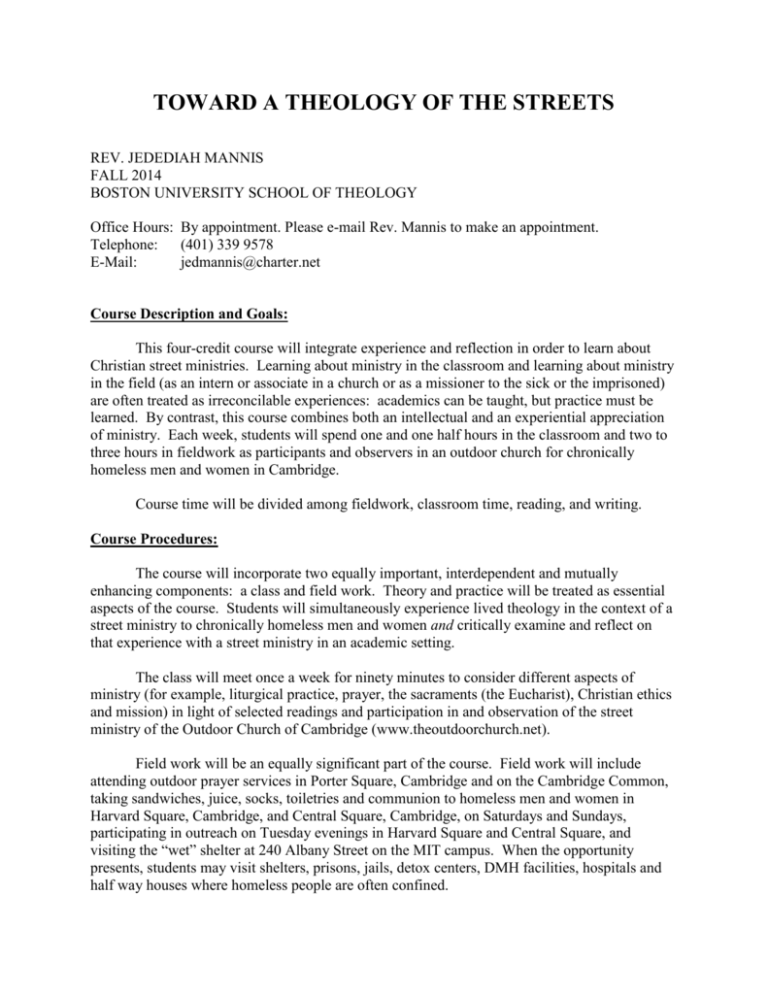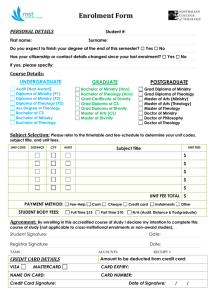WORK AND FAITH - Boston University
advertisement

TOWARD A THEOLOGY OF THE STREETS REV. JEDEDIAH MANNIS FALL 2014 BOSTON UNIVERSITY SCHOOL OF THEOLOGY Office Hours: By appointment. Please e-mail Rev. Mannis to make an appointment. Telephone: (401) 339 9578 E-Mail: jedmannis@charter.net Course Description and Goals: This four-credit course will integrate experience and reflection in order to learn about Christian street ministries. Learning about ministry in the classroom and learning about ministry in the field (as an intern or associate in a church or as a missioner to the sick or the imprisoned) are often treated as irreconcilable experiences: academics can be taught, but practice must be learned. By contrast, this course combines both an intellectual and an experiential appreciation of ministry. Each week, students will spend one and one half hours in the classroom and two to three hours in fieldwork as participants and observers in an outdoor church for chronically homeless men and women in Cambridge. Course time will be divided among fieldwork, classroom time, reading, and writing. Course Procedures: The course will incorporate two equally important, interdependent and mutually enhancing components: a class and field work. Theory and practice will be treated as essential aspects of the course. Students will simultaneously experience lived theology in the context of a street ministry to chronically homeless men and women and critically examine and reflect on that experience with a street ministry in an academic setting. The class will meet once a week for ninety minutes to consider different aspects of ministry (for example, liturgical practice, prayer, the sacraments (the Eucharist), Christian ethics and mission) in light of selected readings and participation in and observation of the street ministry of the Outdoor Church of Cambridge (www.theoutdoorchurch.net). Field work will be an equally significant part of the course. Field work will include attending outdoor prayer services in Porter Square, Cambridge and on the Cambridge Common, taking sandwiches, juice, socks, toiletries and communion to homeless men and women in Harvard Square, Cambridge, and Central Square, Cambridge, on Saturdays and Sundays, participating in outreach on Tuesday evenings in Harvard Square and Central Square, and visiting the “wet” shelter at 240 Albany Street on the MIT campus. When the opportunity presents, students may visit shelters, prisons, jails, detox centers, DMH facilities, hospitals and half way houses where homeless people are often confined. 2 In particular, the course will explore specific theological ideas and practices through the lens of street ministry. Each class will focus on one theological topic. Each student will each lead one class session, providing study and discussion questions to other students in advance. Each week, each student will prepare a reflection on their recent field experience and the theological topic of the upcoming class. The course will be taught as a seminar. Enrollment will be limited to twelve students. Learning Objectives: By the conclusion of the course, students will be able to: Identify significant features of, and challenges for, social outreach ministries in the Boston area or in areas in which they expect to minister; Critically evaluate various forms of street ministry or mission as calls to discipleship and in terms of their efficacy and efficiency as they might be implemented in the Boston area or where they expect to minister; Gain a deeper and richer understanding of elements of practical theology by observing, participating in, and critically examining the practice of street ministry; Begin to develop a personal theology that will inform the work they will do as ministers; Develop and put in practice their own ministries of social outreach in many different settings (street ministries, prison chaplaincies, hospital chaplaincies, etc.) in light of some key elements of systematic and practical theology; and, as a result, Make thoughtful and informed decisions about the direction and substance of their own calls to lay or ordained ministry. Course Requirements: The course is a community for learning, critical reflection, and spiritual growth. Students are encouraged to engage actively in class discussion. The requirements for the course are: 1) Students will spend two to three hours on average each week at an Outdoor Church site (Saturday in Harvard Square and Central Square, Saturday at Alewife Rotary, Sunday in Porter Square, Sunday on the Cambridge Common, Sunday in Harvard Square and Central Square, and Thursday at 240 Albany Street). Students will rotate among these sites, so that each student will have two opportunities to serve at each of the six sites. 2) By the second week of the semester, students will design a 1-page learning agreement for their field work; the learning agreement should specify the student’s own desired learning outcomes and will be approved/revised in consultation with instructor. At the end of the semester, students will complete a self-evaluation of their field work in terms of the learning outcomes agreed upon 3 at the beginning of the semester. These assignments will factor into the field work course grade along with the instructor’s overall observation of the student’s responsibility for the work on site. 3) Students should read carefully for each class session. Each week, one student will lead class discussion on a particular topic. Discussion will be based on study questions prepared by the student and distributed to the other students in advance. 4) Students will prepare a one-page reflection each week on some aspect of their field experience or on the upcoming class topic, and be prepared to discuss the reflection in class. Reflections should be sent to the instructor at jedmannis@charter.net the night before they are due. 5) Each student will lead one of the classes. In anticipation of that class, students will circulate two or three study questions at least forty-eight hours in advance of the class; the questions will be the foundation of class discussion. 6) Students will prepare one 10-12 page paper that will integrate learning across the semester’s academic and experiential components, incorporate research, and build an argument for a coherent theology of the street. The paper will be due at the last class, and may be submitted electronically or by hard copy. 7) Students will read an assigned Scripture in anticipation of each class meeting. The reading is intended to frame that week’s topic and/or concern in a theological framework. Evaluation: Attendance and seminar participation: Field Work (includes student’s learning agreement and self-evaluation): Class presentation and facilitation of discussion: Weekly reflection papers: Final paper: 20% 20% 20% 20% 20% Other Important Considerations: ACADEMIC CONDUCT: The STH Academic Code of Conduct may be found on the STH website at: www.bu.edu/sth/academic/academic-conduct. All students are required to familiarize themselves with this code, its definitions of misconduct, and its sanctions. Students should especially familiarize themselves with the section on plagiarism. PLAGIARISM: All written work in this course must be original to you. If you consult outside texts, please cite these sources in the proper format. This pertains to all external sources (books, journals, lectures, sermons, web-sites). Be mindful that BUSTH policy regards plagiarism as also meaning, “Submitting the same work in more than one course without the consent of instructors.” 4 STUDENTS WITH DISABILITIES: Any students who believe they have a disability should meet with BU Disability Services as soon as possible at the beginning of the semester to initiate disability verification and discuss accommodations that may be necessary to ensure your successful completion of course requirements. That office is at 19 Deerfield Street and can be contacted at 617.353.3658. That office then sends request for accommodations to the Academic Dean who forwards them to the instructor. Class Schedule: Class #1(09/02): Introduction to course Reading assignment: Mannis, Joseph Tuckerman and the Outdoor Church, pp. 1-13. Jencks, The Homeless, pp. 1-74. Scriptural passage: Luke 4:16-21. Field work: Two to three hours at one of the following: Saturday in Harvard Square and Central Square, Tuesday at Alewife Rotary, Sunday in Porter Square, Sunday on the Cambridge Common, Sunday in Harvard Square and Central Square, Tuesday in Harvard Square and Central Square, and Thursday at 240 Albany Street. PART A: Systematic theology adapted to the street Class #2 (09/09): Joseph Tuckerman Reading assignment: Mannis, Joseph Tuckerman and the Outdoor Church, pp. 14-44. Scriptural passage: Matthew 19:21-22. Class #3 (09/16): The Social Gospel Movement and Walter Rauschenbusch Reading assignment: Herbst, “Francis Greenwood Peabody: Harvard’s Theologian of the Social Gospel Movement”, pp. 45-69. Rauschenbusch, Theology for the Social Gospel, pp. 1-109. Scriptural passage: Col. 3:15. PART B: A street theology emerging from the street Class #4: (09/23): William Stringfellow Reading assignment: Griffiss, “A Reluctant Anglican Prophet,” pp. 40-50. Stringfellow, Free in Obedience, pp.1-128. Scriptural passage: Romans 6:17. 5 Class #5: (09/30): Free Will: Mental Illness Reading assignment: Maté, In the Realm of Hungry Ghosts, pp. 1-48, 90-103 Issac and Armat, Madness in the Streets, pp. 1-16, 142-160, 287-334. Scriptural passage: Job 19:21. Class #6: (10/07): Free Will: Substance Abuse Reading assignment: Mannis, Joseph Tuckerman, pp. 113-127 Maté, In the Realm of Hungry Ghosts, pp. 301-345. Heyman, Addiction, pp. 65-141. Scriptural passage: Romans 8:2. Class #7: (10/14): Death and Salvation Reading assignment: Mannis, Jedediah, Joseph Tuckerman, pp. 181-211. Parry, Universal Salvation, pp. xv-xxvii, 3-54. Scriptural passage: Romans 6:5, 7-91 Cor 15:21-22. PART C: Ministry in a church grounded in a street theology Class #8: (10/21): The Church Reading assignment: Mannis, Joseph Tuckerman, pp. 128-159. Bonhoeffer, Life Together, pp. 17-39. Wright, Congregational Polity, pp. 1-65. Scriptural passage: 1 Cor 12:27-31. Class #9: (10/28): Communion Reading Assignment: Mannis, Joseph Tuckerman, pp. 160-180. Miles, Take This Bread: A Radical Conversion, pp. 54-97. Bonhoeffer, Life Together, pp. 110-122. Scriptural passage: 1 Cor 11:23-26. Class #10: (11/04): Pastoral presence 6 Reading assignment: Mannis, Joseph Tuckerman, pp. 98-112. Sweet, God’s Hotel, pp. 1-33, 77-187 Scriptural passage: Matt. 6:9-13; James 5:13-15. Class #11: (11/11): Liturgical practice and prayer Reading assignment: Mannis, Joseph Tuckerman, pp. 70-97. Outdoor Church orders of service from Porter Square and 240 Albany Street. Book of Common Prayer, pp. 61-74, 319-350, 127-136 OR a comparable reading from a liturgical text from your own tradition Scriptural passage: Isaiah 1:11-17. Class #12: (11/18): Ministry as a prophetic demand for justice or as a call to discipleship Reading assignment: Mannis, Joseph Tuckerman and the Outdoor Church, pp. 45-69. Bonhoeffer, The Cost of Discipleship, pp. 41-102. Scriptural reading: Mt 10:5-14; 1 Cor 2:1-3. Class #13: (11/25): Conclusion Reading Assignment: Mannis, Joseph Tuckerman, pp. 212-224. Reading List: Weekly reading assignments average 100 pages. All readings are required. Only Joseph Tuckerman and the Outdoor Church need be purchased; the remaining texts will be available on line and also on reserve at the Boston University School of Theology library. Jedediah Mannis, Joseph Tuckerman and the Outdoor Church (Wipf & Stock, 2009), pp. 1-224 (to be purchased). Conrad Wright, Congregational Polity (Skinner Books, 1997), pp. 1-65. Orders of Service for the Outdoor Church of Cambridge (six pages) Sarah Miles, Take This Bread: A Radical Conversion (Ballantine Books, 2007), pp. 54-97. Walter Rauschenbusch, Theology for the Social Gospel (Abingdon, 1960), pp. 1-109. Dietrich Bonhoeffer, Life Together (Harper Collins, 1954), pp. 17-39. Gene M. Heyman, Addiction: A Disorder of Choice (Harvard University Press, 2009), pp. 44141. Robin A. Parry, ed., Universal Salvation? The Current Debate (Eerdmans, 2003), xv-xxvii, 3-54. Dietrich Bonhoeffer, The Cost of Discipleship (Simon & Schuster, 1995), 41-102. Book of Common Prayer (Church Publishing, 1979), pp. 61-74, 319-350, 127-136. 7 Justin Herbst, “Francis Greenwood Peabody: Harvard’s Theologian of the Social Gospel,” Harvard Theological Review, Vol. 54, No. 1 (Jan., 1961), pp. 45-69. William Stringfellow, Free in Obedience (Wipf & Stock, 2006), pp. 1-128. James E. Griffiss, “A Reluctant Anglican Prophet,” in Robert Boak Slocum, Prophet of Justice, Prophet of Life: Essays on William Stringfellow (Church Publishing, 1997), pp. 40-50. Christopher Jencks, The Homeless (Harvard University Press, 1994), pp. 1-74. Victoria Sweet, MD, God’s Hotel (Riverhead Books, 2012), pp. 1-33, 77-187. Gabor Maté, In the Realm of Hungry Ghosts (North Atlantic Books, 2010), pp. 1-103. Rael Jean Isaac & Virginia C. Armat, Madness in the Streets: How Psychiatry and the Law Abandoned the Mentally Ill (Treatment Advocacy Center, 1990), pp. 1-16, 142-160, 287334.








